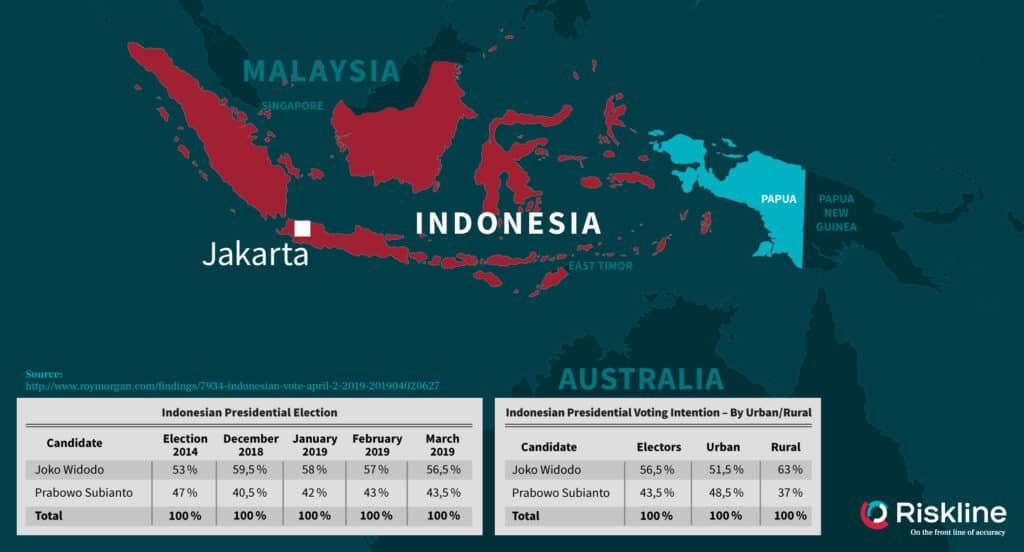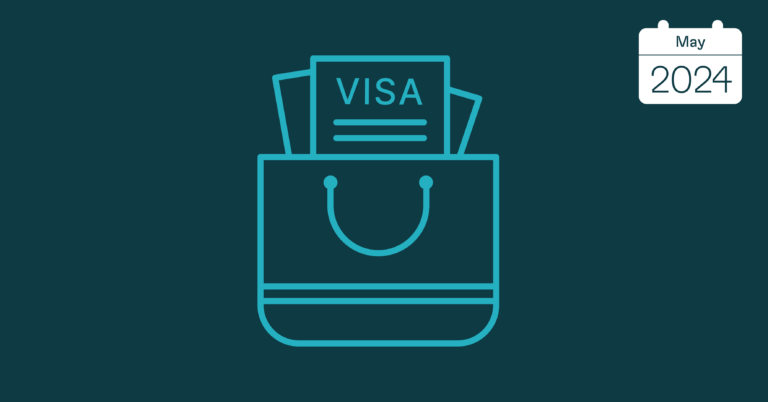On 17 April, as many as 192 million eligible citizens will cast their vote in Indonesia’s upcoming general elections. For the first time in the country’s history, elections for the presidency and approximately 20,000 national and local legislative seats will be held simultaneously, making it a complex and logistically challenging process in the archipelagic state.
The leading candidates in the presidential race are incumbent Joko ‘Jokowi’ Widodo of the Indonesian Democratic Party of Struggle (PDI-P) and his challenger former general Prabowo Subianto, who contested against Jokowi unsuccessfully in the 2014 elections, from the Great Indonesia Movement Party, simply known as Gerindra. Prabowo is a part of the traditional elite and was previously married to the daughter of former dictator Suharto, in contrast to Jokowi, who upon election was a political outsider and a former furniture businessman. This time around, Prabowo, to bolster his previous lack of support among millennials, who make-up around 40 percent of voters, picked Sandiaga Uno, a former venture capitalist with strong youth appeal, as his vice-presidential running mate. Jokowi, on the other hand, partnered with Ma’ruf Amin, a cleric and leader of the country’s largest Islamic organisation, as his running mate, boosting his religious credentials in an attempt to win over more conservative voters. While opinion polls project a decisive win for incumbent Jokowi, Prabowo’s ticket has gained considerable ground as the campaign period draws to a close on 14 April, particularly in urban areas, with a recent Roy Morgan survey putting him within three percentage points of Jokowi.
The elections for national and provincial legislatures, on the other hand, will be contested by more than 245,000 candidates from over 16 parties. Due to the diverse nature of Indonesian politics, no party is expected to win an outright majority in the parliamentary elections, making coalition building necessary. Jokowi’s PDI-P is currently the single largest party in parliament, with 109 out of 560 seats; the PDI-P-led ruling coalition in turn commands a parliamentary majority of 386 seats. While the role of the legislative branch is less pronounced in Indonesia’s presidential republic system, having sufficient parliamentary support is vital for any incoming president in order to effectively fulfil their policy agenda. In this regard, should Prabowo win, his party will find it harder to cobble together a majority as their five-party coalition lack the clout of PDI-P’s nine-party alliance, which won over 62 percent of the legislative vote in the 2014 elections.
There has been no major political unrest in the lead-up to the elections, and it is unlikely that it would break out in the remaining days. However, there remains a strong threat of unrest and clashes in the restive Papua region, where an armed secessionist movement is active and an uptick in violence has taken place since December 2018. Attacks against electoral workers and infrastructure were reported during regional gubernatorial elections in Papua province in June 2018, and it is likely that Papuan separatists might carry out similar sporadic attacks targeting electoral and political infrastructure as the polling day draws closer.
Sectarian undertones against the economically successful ethnic Chinese minority played up by certain actors in the previous elections have largely been kept at a minimum and Islamist sentiments have not dominated the political narrative. This can be partly attributed to Jokowi’s decision of choosing a conservative Muslim running mate, Ma’ruf Amin, who is the leader of Nahdlatul Ulama (NU), the country’s largest Muslim movement. Indeed, Jokowi has in the past been labelled as anti-Islam by some conservatives – even though he himself is a practicing Muslim – mainly because of his association with Basuki ‘Ahok’ Tjahaja Purnama, the former Jakarta governor who is his close friend and political ally. Ahok, an ethnic Chinese Christian, was jailed for two years in 2017 on blasphemy charges during the campaign for the 2016 Jakarta gubernatorial elections that triggered mass Islamist protests in Jakarta and other major cities. However, the same level of Islamist mobilisation has not been witnessed during this campaign period. As a widely-respected religious figure, Amin’s entry into politics and his partnership with Jokowi has considerably dampened Islamist sentiments against the incumbent and thereby removed religion as the dominant narrative in these elections.
Nevertheless, the country is still plagued by high levels of income inequality, and this will continue to be one of the key economic challenges that the incoming president will have to deal with. In this regard, both presidential candidates are running on populist platforms promising greater wealth distribution and prosperity for all, but it remains to be seen whether either candidate can alleviate inequality. In addition, there is a disproportionate representation of ethnic Chinese in the nation’s upper-income category due to their involvement in commerce and industry, and this continues to be a long-standing source of contention for many ultranationalists and conservatives., This sentiment, however, has been mitigated by consistent economic growth in recent years, driven by Jokowi’s pursuit of major infrastructure development. Therefore, while existing inter-communal tensions and religious sentiments still exist and inequality remains high the prospect for these factors to drastically affect the elections and cause instability in the short- and medium-term seem unlikely.
Aaron Kunaraja is a Malaysia-based political and security risk analyst covering Southeast Asia.















